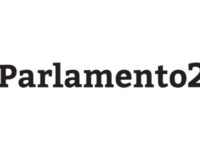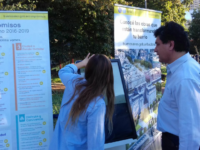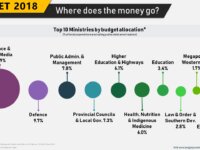A new waste management system, driven by information. Bogota has evolved its cleaning and recycling scheme, generating a profound transformation in the way in which citizens needs are met and garbage collection is managed. This model is based on the effective use of data and information. This initiative has allowed greater transparency in the actions of involved public and private organizations, an intense collaboration to provide the best service and enabling citizens active participation.
Innovation Tag Opengov: accountability
The Artech project invites artists, entrepreneurs, and developers to use public data as a "raw material" for works of art based on traditional arts or digital media. Being a well-known and respectable medium to broad audiences, we see art, as an original and fresh way to expose new audiences to the importance of open data and its relevance. This is the first time that a government agency in Israel has directly sponsored a creative and innovative experience of this kind.
In response to the generalized lack of political accountability and availability of public information, this online tool provides an open and qualified access to the Spanish Parliament’s activity, related to the implementation of the Agenda 2030.It promotes a transparent and participative implementation of this agenda and allows CSOs, policy makers and the media to monitor political proposals.The Spanish Government has included Parlamento2030 as one of the tools of its 2030 Agenda National…
Not only is transparency in Brazil taken as the principle of publicity in public administration, but also as a Public Policy, led by integrated actions focused on achieving specific goals.
Brazilian Government has reaped concrete quantitative and qualitative transparency-driven results: saving of resources, reformulation of public policies and inhibition of misconduct and corruption acts.
The Transparency Portal is the core of the policy and central tool to promote results through transparency.
En 2015, le Parlement de Wallonie a engagé une réforme de son Règlement ayant notamment pour objectif d’associer davantage les citoyens wallons au travail législatif des députés.
Dans ce cadre, plusieurs dispositifs ont été mis en place dont la modernisation et le renforcement du droit de pétition qui permet aux citoyens de déposer et soutenir des pétitions par voie électronique.
Il s’agit d’un projet novateur pour le Parlement qui se veut plus que jamais ouvert et à…
East Africa has an urgent need for innovative accountability mechanisms, as many public services are inefficient and corrupt. SEMA helps to improve the quality of public service delivery, by gathering real-time citizen feedback and presenting this data in digestible formats. We use low-tech tools, such as custom-made hardware devices and interactive voice response technology, that help citizens from all backgrounds to have a voice in evaluating their public services.
Case Study
Ensuring Impartiality through Identity-Neutrality Provisions: the Case of Freedom of Information in…
The Internet has facilitated online services for citizens, but it has also facilitated Internet searches of service-seeking citizens by public officials, triggering conscious or unconscious bias. Via freedom of information (FOI) requests, academics provided evidence of this phenomenon at work. Brazil's Comptroller General (CGU) responded by implementing a check-box in its online FOI requesting system so that requesters could choose to remain anonymous. This innovation is a first for FOI regimes.
BA Obras is a collaborative initiative to open information on public works in the City of Buenos Aires, seeking to increase transparency in the management of public resources. It consists on a portal through which all the residents of the City can track the works in real time; so they can see what works are being done in their neighborhoods, know the dates of start and end of them, and the investment they require, while they can monitor progress.
‘Budget Promises: Beyond Parliament’ is Sri Lanka’s pioneering budget monitoring platform, created to answer two basic questions about the government’s annual budget – 1) is the government doing what they are saying? and 2) is the government saying what they are doing? Since its launch, the platform has been a primary source for citizens, media, and researchers to track progress on budget promises.
The Open Data Policy of the Federal Executive Branch was established by the Decree N. 8.777/2016. Besides establishing the possibility of requesting public databases, the policy sets up the obligation for each body to draw up an Open Data Plan (PDA), which systematizes the planning for the opening of public data. The CGU monitors (through www.paineis.cgu.gov.br/dadosabertos) around 230 federal agencies covered by the decree, establishing regular and customized contact with public managers.






